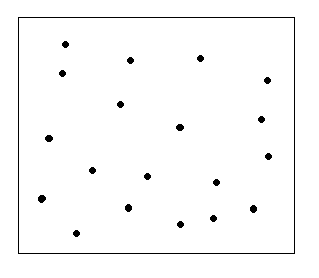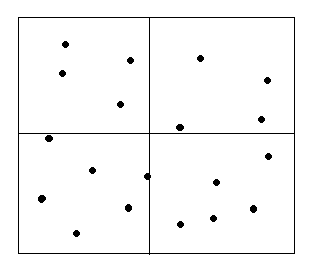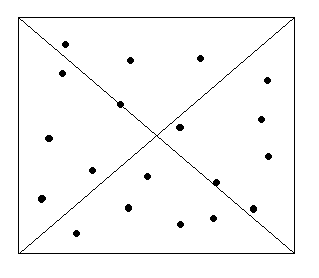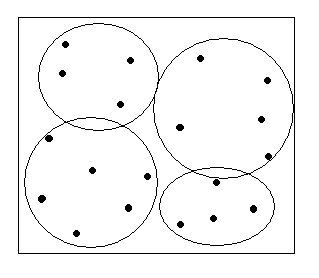"I play war games but not computer games."
"I play RPGs but not CCGs."
You probably think that this is going to be another one of those "why can't we all just get along" or "All game types have good things about them" posts, but it won't.
I'm interested right now in how, or why, we define game types at all.
We already know that hybrid games exist. We have half-Euro, half-war games. We're getting half-CCG, half-RPG games. Half-CCG, half-computer games. So our lines become blurrier.
Even without the blur, what makes us define THIS and THAT?
I'm guessing that there is enough commonality within all things we group as THAT to assure us that the likelihood that we will like another one of THATs is fairly small. For instance, the likelihood that I will like a war game is small, since I don't like the common basic war-game idea ... which is ... um ...
Uh.
I think two-player, multiple moving pieces, direct confrontation resulting in the loss of pieces, combat tables or dice rolls, and simplistic objectives of enduring, securing, or overwhelming. But I don't know. Even if this is all true, I guess that there are some I might enjoy.
Does the definition prejudice me? I.e. do I see a game that is like other war games and not like it because the overwhelming parts that correspond to games I didn't like don't allow me to enjoy the other parts?
Does the definition prejudice the designers/publishers? I.e. do designers and publishers keep creating similar games so that I am less likely to not enjoy one if I don't like the others, instead of creating games out of a free field of ideas (which would produce more hybrids)?
People love to divide things into groups. Here is a graph of all games:

Now I divide them into groups:

That's pretty clear, right? But wait:

And how about:

Which is right? There is a branch of mathematics that finds patterns and matches plots to curves. But games don't work that way. The more games you get, the more noisy the graph becomes.
You may not like a certain theme, generally, but like a particular game. Or you may not like a certain mechanic, but like a certain game.
But wait. "Game"? What is this "game" about which I speak?
Many people define games, anything from an amusement or pastime to a competitive scored activity with rules and goals.
So. You like games, do you? But not what? Not play? Not activities? Not non-competitive activities?
We have a need to define game. We enjoy "games" and not those other things, which are not really games. Is that need ours? I.e. to allow us to separate the types of things that we usually like from those that we don't. Or is it the designers/publishers? I.e. to create things that they think we'll like based on what we already like.
The past few weeks I presented some alternatives to the classical win/lose situations for games.
Now I want to ask the following: how much different is an activity from a game, anyway? What hybrids do we have? What avenues are we blind to?
Yehuda
8 comments:
Part of what I do in my research is look for patterns through data mining.
Your underlying question - How do we group games - depends upon knowing the "Distance metric".
If I show you two games, how far apart would you put those games? What criteria do you use? Your definition of This and That depends upon how close The Other Thing is to This or to That.
In actuality, it doesn't matter - if I present you with enough pairs of games, and you can show me how far apart those games are, I can draw a picture of how those games might live in a space. Groups of games will then become apparent. The concept is repeated and clusters form.
Now, if you change your distance metric, then your clusters will also change.
More importantly, if someone else has a different distance metric (which they will), then their clusters will be different.
We can look at a cluster and attempt to assign it a name - "Wargames", "Eurogames", etc. based upon common features that the game has, but sometimes, a game is in a cluster for other reasons that aren't as obvious.
This inductive approach to classification is more natural than enforcing a classification scheme on to a group of objects, especially when then scheme creates an conflict with your own distance metric.
(Another approach to classification is the faceted approach where you allow multiple tags to be applied to each item, then you can group items as needed for the situation.)
There may be different distance metrics, but it's not clear that all distance metrics are equally good. Some may be theoretically possible, but not very useful to gamers.
The more games you get, the more noisy the graph becomes.
It's not clear that that's true. In theory you could plot a bunch of games and check whether there actually is any significant amount of clustering, but in general I don't see a reason to believe that there won't be clustering.
We have a need to define game.
It depends on what you mean by "define". There aren't any necessary and sufficient criteria that define a set which includes all games and excludes all non-games. There are more typical and less typical games, which have relationships of similarity amongst themselves, but which are not defined by any set of necessary and sufficient conditions.
Now I want to ask the following: how much different is an activity from a game, anyway?
I don't think you can fully separate games and activities. In fact, a game is a type of activity (or playing a game is). At the edges, there may be some activities that some people would call games but others wouldn't, but I don't think much is to be gained by forcing a formal definition of what is a game.
I don't think much is to be gained by forcing a formal definition of what is a game.
I agree; in fact, I think it impedes progress. I am going to continue this with a related article on my blog.
Yehuda
Humans and other animals make distinctions and categorizations by default, out of a need to survival. Our brains are wired that way. We recognize patterns, associate them with prior outcomes. "Last time I ate the red thing I got sick. I'll avoid all red things."
When this process is applied to gaming, is has good and bad results. Good because people like me who spend inordinate amounts of time trying to analyze what it is I like and don't like can more readily evaluate new games. Bad because this process is going to naturally eliminate games which may actually be liked.
I think it is important to use the patterns, as well as to not be a slave to them.
Also, we all perceive things differently, so each of our individual "pattern databases" filters new information uniquely. This is also important and necessary for life (and games) to exist.
Hi Yehuda,
I like the Venn diagram the best.
There is a lot of overlap between game types and genres.
These days, you can probable find at least one game that captures at least a bit of EVERY or LAMOST EVERY type / genre.
Great article. I enjoyed reading it.
Thanks for writing it.
Shalom,
Maksim-Smelchak.
Thanks Yehuda - an interesting and though provoking read!
I find the discussion especially interesting as there have been many discussions (if you can call some of them that) on BGG about game classification and grouping.
Thanks.
Giles.
I'm not sure where the 'though' came into my past post sorry!
I also think it is interesting thinking about and discussing the value, point and positive and negative aspects to groupings.
Cheers!
Giles.
Guess what? We've already drawn a line by defining these things we play as "games". We've separated them from other general amusements. Definition is a necessity of communication.
Post a Comment